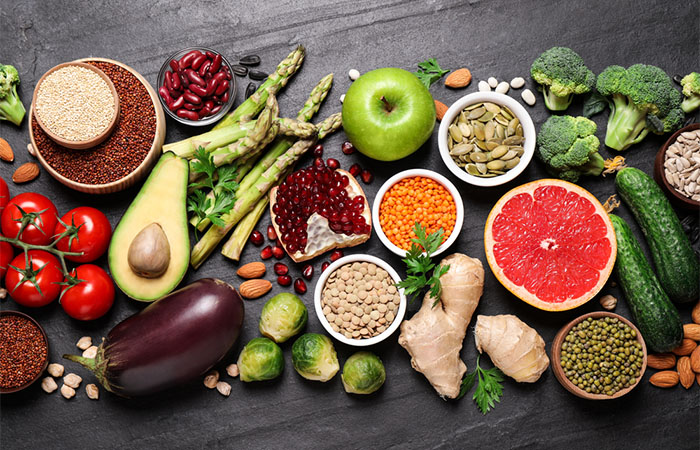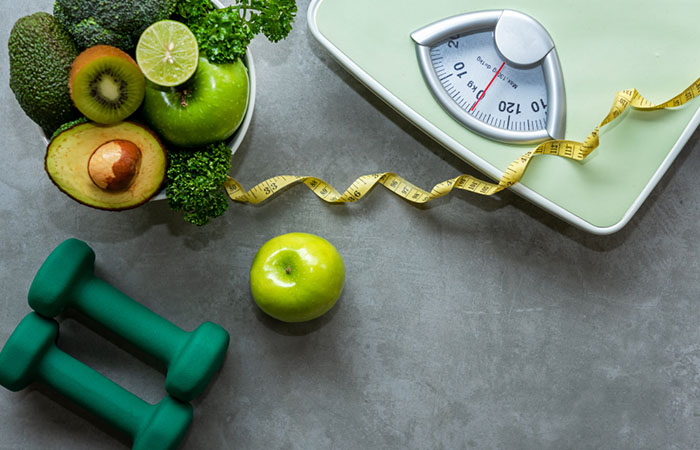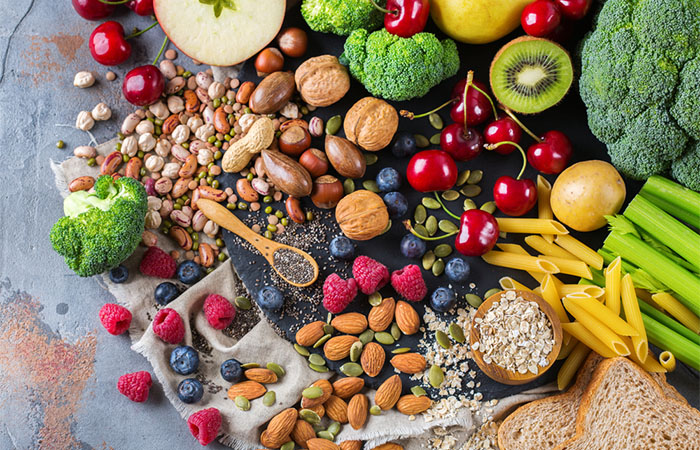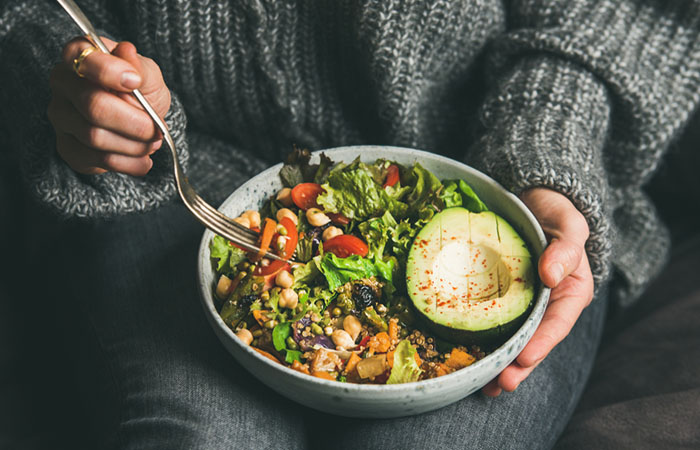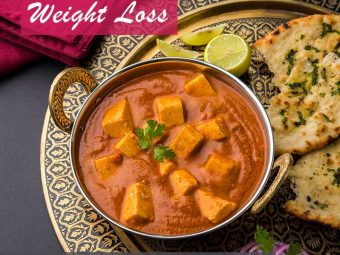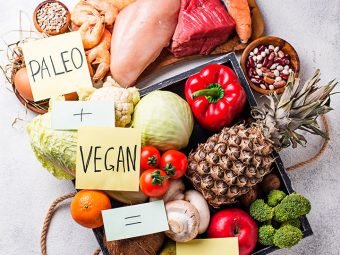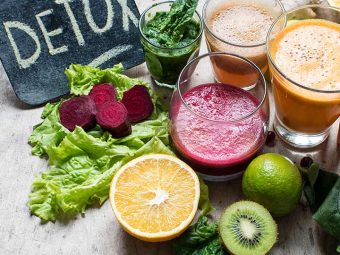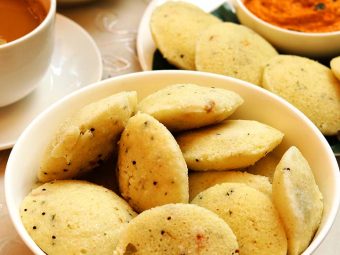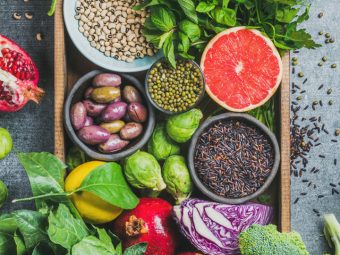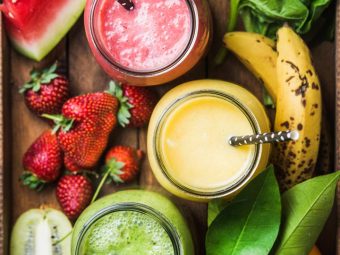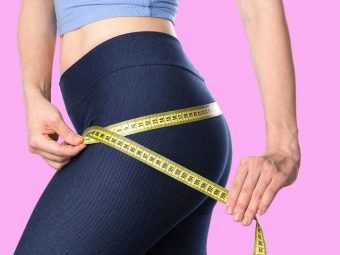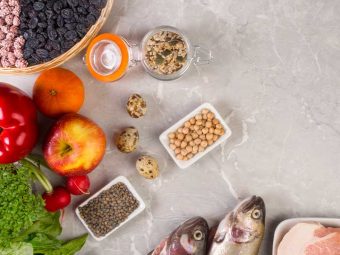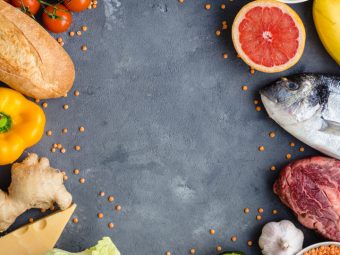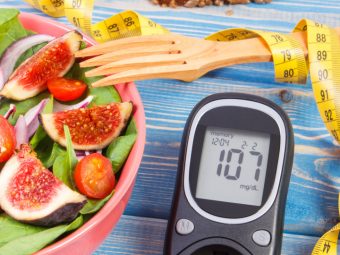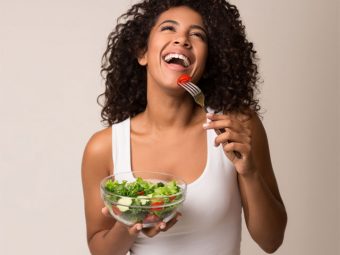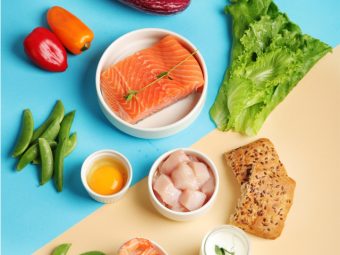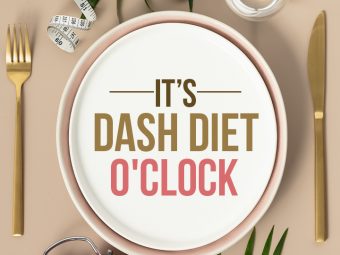Vegan Diet For Weight Loss: How To Follow, Food To Eat, & Meal Planning
Join the vegan revolution to embrace a healthier version of yourself!
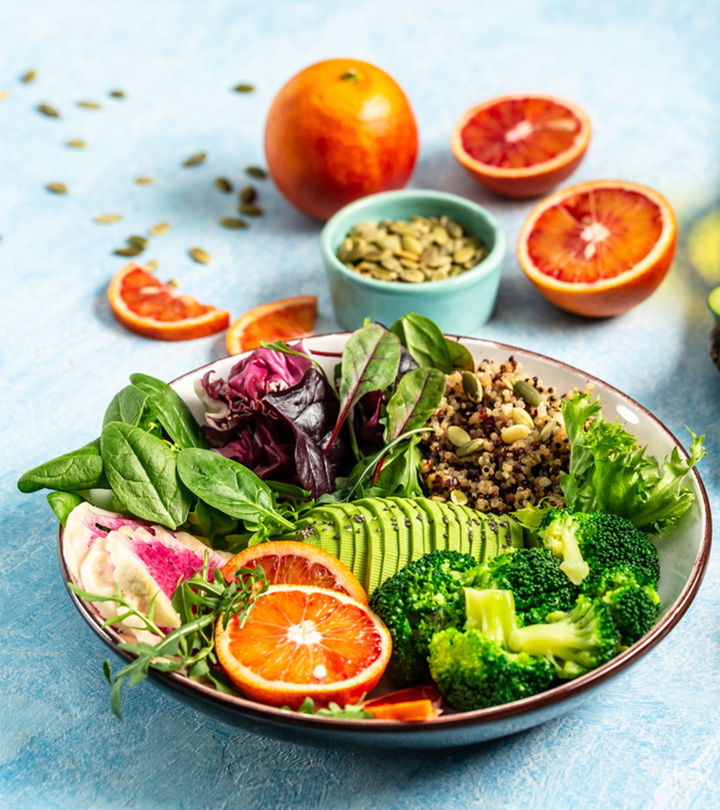
Image: Shutterstock
In a world increasingly focused on health and wellness, the vegan diet has emerged as a compelling eating plan for its potential to not only benefit the planet but also transform one’s own well-being. Beyond its environmental appeal, the vegan diet has garnered attention as a powerful tool for weight management and sustainable, long-term weight loss. The beauty of this diet lies in how it helps in the natural reduction of calorie intake by restricting animal-based products and selecting metabolism-boosting plant-based food. This article provides invaluable tips to help you navigate the world of veganism for weight loss. Whether you are a seasoned vegan or just starting on this path, this article will equip you with the knowledge and tools needed to harness the full potential of the vegan diet in your quest to become a healthier, leaner you.
 At A Glance: Vegan Diet For Weight Loss
At A Glance: Vegan Diet For Weight Loss- Principle: A plant-based diet for weight loss that cuts out all animal products.
- Purpose: To promote healthy and sustainable weight loss.
- Who It Is For: Individuals looking to shed excess pounds.
- Duration: Short-term
- Who Should Avoid: People with medical conditions that require specific dietary restrictions or nutritional intake.
- Cons: May cause protein and other nutritional deficiencies if not followed correctly.
In This Article
What Is A Vegan Diet?
A vegan diet includes eating plant-based foods like fruits, vegetables, whole grains, legumes, nuts, seeds, non-dairy milk alternatives like oat milk, almond milk, and plant-based proteins like tofu and tempeh. All animal-derived products like meat, poultry, fish, dairy, eggs, and other by-products like honey and gelatin are restricted from diet.
The core principle of a vegan diet is to commit to cruelty-free living and environmental sustainability, making it not only a dietary choice but also a lifestyle choice that avoids the exploitation of animals and minimizes the environmental impact of food production. Many people adopt this diet for ethical reasons, health benefits, and to reduce their carbon footprinti XMeasure of the total amount of carbon dioxide released into the atmosphere by an individual due to their activities. . Besides being environmentally-friendly, this diet also helps weight loss. Research suggests that there is significant weight reduction in people who follow a vegan diet (1).
Having explored the fundamentals of a vegan diet it’s essential to shift our focus towards understanding the concept of healthy weight. So let’s jump into the next segment, to know about the various factors that define a healthy weight!
What Is A Healthy Weight?
There is no one-fits-all healthy weight range and it isn’t determined by the scale. A healthy weight is a bodyweight number that is considered optimal for an individual’s overall well-being and is typically determined by assessing a person’s Body Mass Index (BMI)i XValue derived from the mass and height of a person. It is generally body mass divided by the square of body height and generally expressed in units of kg/m2 , which takes their height, age, gender, and body composition into account. It also takes into account various factors, including muscle mass, bone density, and body fat percentage. Achieving a healthy weight range is associated with a reduced risk of chronic diseases like heart disease, diabetes, and certain cancers, as well as improved physical and mental health.
Achieving and maintaining a healthy weight involves healthy eating, optimal sleep, working out, and reducing stress (2). It is essential to approach the weight management process with a focus on sustainable, lifestyle-based changes, rather than solely fixating on changing the number on scale, in order to promote long-term health and well-being.
Having explored the concept of a healthy weight, let’s now delve into the intriguing question Is A Vegan Diet Good For Weight Loss? Read the next segment, to discuss the relationship between a vegan diet and weight management.
Is A Vegan Diet Good For Weight Loss?
A vegan diet can be effective for weight loss, given that its success depends on various factors, including food choices, portion sizes, and overall calorie intake. Research suggests that a vegan diet people who eat vegan tend to have a lower BMI and have effective weight loss due to their vegan choices (3). It was also found that those on a vegan diet lost more weight compared to other diets like vegetarian, semi-vegetariani XDiet that is centered around plant based foods but allows occasional inclusion of meat. , pesco-vegetariani XDiet that is majorly vegetarian but also includes fish and seafood. , and omnivore diets due to their reduced intake of unhealthy fats (3).
One of the other studies also confirmed that plant-based diets are effective for weight loss as vegetarian diets boost metabolism and increase resting energy expenditure (REE), helping with increased calorie burning (4). One of the concerns while following a diet, is that people generally tend to drop a diet after few days or weeks if they find it too restrictive, but studies suggest that vegan diet had a greater dietary adherence other diets and even those who did not follow it perfectly had significant results of weight loss and other benefits like reduction in cholesterol compared to those on non-vegan diet (5). So, yes, a vegan diet can be a good choice for weight loss.
Having established the potential of a vegan diet as a viable option for weight loss, it’s crucial to delve deeper into the pivotal role of nutrition in this endeavor to achieve the weight loss goals. So scroll down to know more about it!
Why Is Nutrition Important In A Vegan Weight Loss Diet?
Nutrition is crucial for a vegan weight loss diet because it ensures that you are shedding pounds and also maintaining overall health. A well-balanced vegan diet shall be designed in such a way that it provides essential nutrients, supports metabolism, controls appetite, and helps you achieve sustainable weight loss. Just going vegan doesn’t guarantee weight loss; you need a smart strategy. Research shows that vegan diets may help with weight loss and overall health but to lose weight, you need to eat fewer calories than you burn. Sometimes vegan diets might feel less satisfying than diets with animal products as they lack processed meat so it is important to find the right balance of fats, fiber, protein, and nutrients in the diet. A vegan weight loss meal plan can help you achieve this balance and reach your goals. So focusing on nutrient-rich foods and portion control is key to achieving your weight loss goals in the long term while staying nourished on a plant-based diet.
After emphasizing the significance of nutrition in a vegan weight loss journey, let’s now embark on the practical path of how to start a vegan diet for weight loss. Check out the below segment, to know about practical steps, tips, and guidance for following a vegan diet!
How To Start A Vegan Diet For Weight Loss
- To begin a vegan diet for weight loss, start by a gradual transition to plant-based foods. Focus on whole, nutrient-dense options like fruits, vegetables, legumes, whole grains, nuts, and seeds.
- Try to monitor portion sizes to create a calorie deficit and aim for balanced meals with a mix of fiber, protein, and healthy fats.
- Experiment with vegan recipes and meal planning to stay satisfied and prevent hunger.
- Remember that patience and consistency are keys to successful and sustainable weight loss on a vegan diet.
Follow the below given steps for a strategized and balanced vegan weight loss diet:
1. Eat Enough Protein
Starting any diet for weight loss requires special attention to protein intake, as it is one of the important components for satiety, muscle maintenance, weight loss, and overall health (6). For ensuring you are getting enough protein on a vegan diet, focus on eating plant-based protein sources like beans, lentils, chickpeas, tofu, tempeh, and edamame. Nuts and seeds, such as almonds, chia seeds, and hemp seeds, are also protein-rich (7). So incorporate these foods into your vegan diet to ensure your daily dose of protein and amino acids.
Consider fortified plant-based protein sources like quinoa (8) and nutritional yeast, which can help meet your protein needs. Additionally, exploring vegan protein supplements like pea protein or rice protein powder, can be added to smoothies or some other recipes. A study suggests that plant based protein powder has similar results when compared with whey powder for high intensity functional training (9). Keep tracking your protein intake and consult with a registered dietitian to ensure you meet your protein needs while working towards your weight loss goals.
2. Focus On Filling Fiber
Fiber can be a great ally in a vegan weight loss diet. It helps in promoting feeling of fullness, preventing overeating, and also supports digestive health. Research suggests that fiber intake irrespective of macronutrients and calorie intake helps in weight loss (10). Here’s how to make fiber work for you:
- Load up on whole grains by choosing brown rice, quinoa, oats, and whole wheat pasta over refined grains as they keep you satiated for longer with its fiber content (11).
- Embrace legume sources like beans, lentils, and chickpeas are excellent sources of plant-based protein and fiber (12). You can add them to soups, salads, and stews for a filling meal.
- Non-starchy vegetables are low in calories and high in fiber like leafy greens, broccoli, and bell peppers. Also don’t forget fruits like berries, apples, and citrus fruits as they are packed with fiber.
- Try to check the nutrition label for high fiber content while shopping to aim for products with at least 3-5 grams of fiber per serving.
Incorporating fiber-rich foods into your vegan diet will help you not only manage your appetite effectively but also support your weight loss goals in a healthy and sustainable way.
3. Avoid Processed Vegan Food
The vegan diet offers a wide array of plant-based alternatives to animal products, but keep in mind that not all vegan labeled foods are healthy, especially when it comes to weight loss. It’s crucial to avoid highly processed vegan foods like vegan junk food and heavily refined options. Plant-based burgers, pizzas, frozen meals, and vegan desserts are readily available, but they often contain high levels of refined sugars, unhealthy fats, and additives which can hinder your weight loss efforts.
Processed foods are often linked to weight gain, so focus on whole, unprocessed foods that are naturally vegan and lower in calories and loaded with nutrients and fiber that support weight loss (13). Prioritizing whole foods over processed options to achieve your weight loss goals while nourishing your body with wholesome nutrition.
4. Check Food Labels
It’s crucial to become a diligent food label reader especially when you are on a diet. Many processed and packaged foods may contain hidden animal-derived ingredients, unhealthy fats, or excessive sugars that can hinder your weight loss efforts. So look for products labeled as “vegan” or “plant-based” to ensure they align with your dietary choices. Pay close attention to the ingredient list, checking for any animal-derived additives or by-products.
Additionally, keep an eye on calorie content, saturated and trans fats, added sugars, and sodium levels. A study revealed that weight loss behavior was 2-4 times more in individuals who used food labels frequently to derive information on calories, and ingredients (14). Opt for products with lower saturated fats and sugars and higher fiber content.
By becoming mindful of food labels, you can make informed choices, select healthier options, and maintain better control over your calorie intake, supporting your vegan weight loss journey effectively.
5. Skip Refined Sugar
In the journey of successful weight loss on a vegan diet, it’s crucial to avoid or significantly reduce your intake of refined sugar. Refined sugars are commonly found in candies, sodas, and processed foods and they offer empty calories with minimal nutritional value. They cause energy spikes and crashes, increased cravings, and unwanted weight gain.
So instead, focus on naturally sweet alternatives like fresh fruits that provide essential vitamins, minerals, and fiber along with sweetness. You can also incorporate natural sweeteners like maple syrup or agave nectar in moderation, but be mindful of portion sizes.
 Pro Tip
Pro TipHaving laid the foundation of how to follow a vegan diet with weight loss in mind, it’s time to delve into the delightful world of healthy vegan foods for weight loss. So check out the next section, to explore a diverse array of plant-based options that support your weight loss goals and tantalize your taste buds!
Healthy Vegan Foods For Weight Loss
Here’s a list of healthy vegan food options for weight loss:
- Legumes: Try to incorporate at least 3-4 servings of legumes like beans, lentils, soybeans, peas, and chickpeas as they are packed with protein and fiber and can be used in soups, stews, and salads.
- Leafy Greens: Eating 2 cups of dark greens like spinach, kale, swiss chard, and other leafy greens is recommended for vegan diet as they low in calories and high in nutrients can be used in salads, smoothies, or as a base for stir-fries.
- Whole Grains: 3 servings of whole grains like quinoa, brown rice, and oats, is recommended daily as it provides sustained energy and keeps you full longer.
- Berries: A cup of berries like blueberries, strawberries, and raspberries can make a satisfying snack or addition to breakfast as they are low in calories and rich in antioxidants and fiber.
- Nuts and Seeds: Eat a serving of nuts and seeds of each like almond, chia seeds, and flax seeds as they offer healthy fats, protein, and fiber. You can sprinkle them on oatmeal or yogurt or enjoy them as a snack in moderation.
- Tofu And Tempeh: Incorporate at least a ½ cup of these plant-based protein sources in a vegan diet. They are versatile and can be used in sandwiches, or salads to add texture and protein to your meals.
- Avocado: Rich in healthy fats, eat at least ½ or 1 avocado daily as it keeps you full and satisfied. Enjoy them in salads, spreads, or as a creamy addition to smoothies.
- Non-Dairy Yogurt: Unsweetened, non-dairy yogurt made from almonds, soy, or coconut act as a lower-calorie vegan alternative to traditional yogurt. Try to incorporate 1-2 cups of low fat non-dairy yogurt in your diet.
- Herbs and Spices: Spices like turmeric, cinnamon, and cayenne can add flavor to your meals and boost metabolism so add them as per your taste.
- Nutritional Yeast: Using 10-30 grams or up to several tablespoons of nutritional yeast adds a cheesy flavor to dishes and is often used in vegan recipes as a cheese substitute.
With a wealth of healthy vegan foods at your knowledge, the next step in your weight loss journey is effective meal planning. In our upcoming segment, on how to plan a meal plan for a vegan weight loss diet, get ready to learn the art of meal preparation that will keep you on track and delight your taste buds.
How To Meal Plan For A Vegan Weight Loss Diet
Meal planning is a key component of a successful vegan weight loss diet. Here’s how to plan and do it effectively:
- Set Clear Goals: Define your weight loss goals, and decide how much weight you want to lose and in what timeframe. Having specific goals will guide your meal planning.
- Calculate Calorie Needs: Determine your daily calorie needs for weight loss. Online calculators or applications for calorie counting can help, or you can consult a dietitian for personalized guidance.
- Choose Nutrient-Rich Foods: Focus on nutrient-dense foods like fruits, vegetables, whole grains, legumes, and lean plant-based proteins, that are lower in calories but high in essential nutrients.
- Practice Portion Control: Be mindful of portion sizes and use measuring cups and a food scale to ensure you’re not overeating.
- Eat Balanced Meals: Plan balanced meals that include a source of protein (e.g., tofu, beans), complex carbohydrates (e.g., quinoa, sweet potatoes), healthy fats (e.g., avocado, nuts), and plenty of vegetables.
- Cook At Home: Preparing meals at home to have control over ingredients and portions. Experiment with new vegan recipes to keep meals exciting.
- Prep Ahead: Spend some time each week washing, chopping, and portioning out fruits and veggies. This makes healthy snacks and meals more accessible.
- Stay Hydrated: Drink plenty of water throughout the day. Sometimes, thirst can be mistaken for hunger.
- Track Progress: Keep a food journal or use a meal tracking app to monitor your daily food intake and to ensure you’re meeting your goals and on the right track.
- Focus On Variety: Rotate foods and recipes to prevent boredom and ensure you get a wide range of nutrients and to maintain that adherence.
Here’s a sample vegan weight loss meal plan to give you a general idea. Adjust the portions and calorie intake to meet your specific needs. Consult with a registered dietitian for a personalized plan is highly recommended.
Sample Meal Plan
Breakfast
- ½ cup oatmeal with almond milk, ½ cup chopped mixed berries and 10-12 almonds
Lunch
- Mixed greens salad with chickpeas (1 cup), and ½ cup of cherry tomatoes, cucumbers, and 2 tablespoons of balsamic vinaigrette
- Quinoa (1/2 cup)
Snack
- 1 cup carrot and celery sticks with hummus (2 tablespoons)
Dinner
- 1 portion of baked tofu (4 oz) with a squeeze of lemon, 1 cup steamed broccoli, and ½ cup brown rice
Day 2
Breakfast
- Vegan whole-grain toast (2 slices) with avocado (1/2) and ¼th cup cherry tomatoes
Lunch
- Lentil and vegetable soup (1 cup) with 1 whole-grain roll
Snack
- Mixed nuts (almonds, walnuts, and cashews) (1/4 cup)
Dinner
- Vegan chili with kidney beans and plenty of veggies like bell pepper, and tomatoes(1.5 cups)
- Quinoa (1/2 cup)
 Quick Tip
Quick TipNow that we have understood meal planning for the vegan weight loss journey, let’s delve into the practical strategies and tips that can make our efforts even more effective. So check out our upcoming segment on tips for weight loss on a vegan diet!
Tips For Weight Loss On A Vegan Diet
Here are some tips for achieving weight loss on a vegan diet:
- Stay Hydrated: Drinking water can help control your appetite and prevent overeating, as sometimes, thirst can be mistaken for hunger.
- Mindful Eating: Pay attention to what and how much you are eating. Eating slowly and savoring your food can help you recognize when you’re full and save you from overeating.
- Control Portions: Using smaller plates and bowls can help you with portion control. So be mindful of portion sizes when dining out as well.
- Physical Activity: Combine your diet with regular physical activity. Aim for a mix of cardio and strength training exercises to boost metabolism and burn calories.
- Sleep Well: Aim for 7-9 hours of quality sleep each night. Poor sleep can disrupt appetite-regulating hormones and lead to weight gain.
- Manage Stress: Stress can lead to emotional eating and lead to weight gain. So practice stress-reduction techniques like meditation, yoga, or deep breathing exercises.
- Be Patient: Sustainable weight loss takes time. Adhere to diet, even if you do not see results in the initial phase of the diet as it takes time.
- Celebrate Non-Scale Victories: Focus on achieving more than just the number on the scale. Celebrate even small results and improvements in energy, fitness, and overall well-being.
Vegan diet can prove to be an excellent option for weight loss, but like any other dietary choice there are some considerations to keep in mind while selecting it. So check out the next section to know the risks of vegan diet!
Risks Of A Vegan Diet
Some of the risks associated with long-term vegan diet include (15):
- Nutrient Deficiencies: Vegan diet might lack essential nutrients such as vitamin B12, vitamin D, iron, calcium, omega-3 fatty acids, and micronutrients like zinc, which are primarily found in animal products. Deficiencies can lead to anemia, weak bones, and impaired neurological function.
- Low Protein: Plant-based proteins often lack one or more essential amino acids. Proper protein combinations and varieties are crucial to ensure adequate intake of all essential amino acids.
- Low Energy Levels: Vegans might consume fewer calories, leading to insufficient energy intake, especially for athletes or individuals with high energy needs.
- Eating Disorders: Veganism can sometimes be a cover for restrictive eating patterns or orthorexia, a condition where a person becomes obsessed with eating only foods they consider healthy leading to unhealthy weight loss.
- Social Challenges: Veganism can be socially isolating for some, as it makes dining out or attending social events challenging when non-vegan options prevail.
The vegan weight loss diet can be a powerful and compassionate way to shed excess pounds while nurturing overall health and well-being. It emphasizes on consuming nutrient-dense, plant-based foods, controlling portions, and incorporating regular physical activity, to achieve weight loss goals while aligning with ethical and environmental values. The evidence-backed benefits of a vegan diet, including reduced risk of chronic diseases, lower cholesterol, and enhanced metabolism, make it a compelling choice for those seeking a healthier lifestyle. As with any dietary journey, it’s essential to approach it with patience, balance, and a commitment for long-term well-being, recognizing that sustainable weight loss is not just about shedding pounds but also about maintaining a harmonious relationship with food and the world around us.
Frequently Asked Questions
Why am I not losing weight on a vegan diet?
If you are not losing weight on a vegan diet it may be due to excessive calorie intake from high-calorie vegan foods or lack of portion control, so check your diet again to find the reason. Additionally, inadequate physical activity can also hinder weight loss efforts, highlighting the need for a comprehensive approach to a healthy vegan lifestyle.
Can a vegan diet cause weight gain?
A vegan diet can cause weight gain if it includes calorie-dense, processed, or high-sugar vegan foods and lacks balance. Weight gain or loss ultimately depends on overall calorie intake and expenditure.
How much weight can you lose on a vegan diet?
The amount of weight you can lose on a vegan diet depends on individual factors like calorie intake, activity level, and individual metabolism. Generally, safe and sustainable weight loss of about 1-2 pounds (0.45-0.9 kilograms) per week is achievable through a balanced vegan diet and regular exercise.
Can vegans lose belly fat?
Yes, vegans can lose belly fat by adopting a well-balanced, calorie-conscious vegan diet combined with regular exercise. Reducing overall body fat through a healthy lifestyle can lead to a reduction in belly fat over time.
Key Takeaways
- A vegan weight loss diet consists of eating plant-based foods like whole grains, vegetables and fruits, legumes, and restricting animal-based products.
- Vegan diets have scientific evidence that they help in loosing weight, boost metabolism, and can even reduce BMI in some individuals.
- To follow a well-balanced vegan diet for weight loss, it is important to get enough protein, fulfill fiber requirements, reduce processed food and avoid refined sugar.
- When this diet is combined with physical activity, mindful eating, and portion control, it gives sustainable weight loss results and promotes overall well-being.
Watch this quick video to uncover the power of plant-based foods in shedding those extra pounds. From nutrient-packed greens to satisfying legumes, you’ll discover the key ingredients for a successful weight loss journey and overall well-being.
Sources
Articles on StyleCraze are backed by verified information from peer-reviewed and academic research papers, reputed organizations, research institutions, and medical associations to ensure accuracy and relevance. Read our editorial policy to learn more.
- Effects of Plant-Based Diets on Weight Status: A Systematic Review
https://www.ncbi.nlm.nih.gov/pmc/articles/PMC7533223/ - Healthy Weight Nutrition and Physical Activity
https://www.cdc.gov/healthyweight/index.html - Comparative effectiveness of plant-based diets for weight loss: A randomized controlled trial of five different diets
https://www.sciencedirect.com/science/article/abs/pii/S0899900714004237 - High Vegetable Fats Intake Is Associated with High Resting Energy Expenditure in Vegetarians
https://www.ncbi.nlm.nih.gov/pmc/articles/PMC4517036/ - Dietary adherence and acceptability of five different diets including vegan and vegetarian diets for weight loss: The New DIETs study
https://www.sciencedirect.com/science/article/abs/pii/S147101531500080X - The role of protein in weight loss and maintenance
https://pubmed.ncbi.nlm.nih.gov/25926512/ - Sustaining Protein Nutrition Through Plant-Based Foods
https://www.ncbi.nlm.nih.gov/pmc/articles/PMC8804093/ - Unlocking the potential of EU cultivated quinoa through the production of protein-rich quinoa flour and functional quinoa starch
https://www.nal.usda.gov/research-tools/food-safety-research-projects/unlocking-potential-eu-cultivated-quinoa-through - The Effects of Whey vs. Pea Protein on Physical Adaptations Following 8-Weeks of High-Intensity Functional Training (HIFT): A Pilot Study
https://www.ncbi.nlm.nih.gov/pmc/articles/PMC6358922/ - Fiber Intake Predicts Weight Loss and Dietary Adherence in Adults Consuming Calorie-Restricted Diets: The POUNDS Lost (Preventing Overweight Using Novel Dietary Strategies) Study
https://pubmed.ncbi.nlm.nih.gov/31174214/ - Weight loss induced by whole grain-rich diet is through a gut microbiota-independent mechanism
https://www.ncbi.nlm.nih.gov/pmc/articles/PMC6969707/ - Legume Intake Body Weight and Abdominal Adiposity: 10-Year Weight Change and Cross-Sectional Results in 15185 U.S. Adults
https://www.ncbi.nlm.nih.gov/pmc/articles/PMC9864712/ - First randomized controlled study finds ultra-processed diet leads to weight gain
https://clinicalcenter.nih.gov/about/news/newsletter/2019/summer/story-01.html - Association of frequent use of food labels with weight loss behaviors among low-income reproductive-age women
https://pubmed.ncbi.nlm.nih.gov/25551753/ - The Impact of a Vegan Diet on Many Aspects of Health: The Overlooked Side of Veganism
https://www.ncbi.nlm.nih.gov/pmc/articles/PMC10027313/




